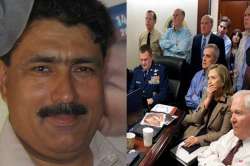Doctor Who Led CIA To Bin Laden Is Jailed For 33 Years For Treason
Islamabad, May 24: A Pakistani doctor who helped the U.S. track down Osama bin Laden was sentenced to 33 years in prison on Wednesday for conspiring against the state, officials said, a verdict that is

Islamabad, May 24: A Pakistani doctor who helped the U.S. track down Osama bin Laden was sentenced to 33 years in prison on Wednesday for conspiring against the state, officials said, a verdict that is likely to further strain the country's relationship with Washington.
Shakil Afridi ran a vaccination programme for the CIA (Central Intelligence Agency) to collect DNA and verify bin Laden's presence at the compound in the town of Abbottabad where U.S. commandos killed the al-Qaida chief last May in a unilateral raid.
The operation outraged Pakistani officials, who portrayed it as an act of treachery by a supposed ally.
Senior U.S. officials have called for Afridi to be released, saying his work served Pakistani and American interests. But many Pakistani officials, especially those working for the country's powerful spy agency, do not see it that way.
Afridi's conviction comes at a sensitive time because the U.S. is already frustrated by Pakistan's refusal to reopen NATO supply routes to Afghanistan.
The supply routes were closed six months ago in retaliation for American airstrikes that killed 24 Pakistani soldiers.
Afridi was detained sometime after the May 2, 2011, raid, but the start of his trial was never publicised.
Shakil Afridi ran a vaccination programme for the CIA (Central Intelligence Agency) to collect DNA and verify bin Laden's presence at the compound in the town of Abbottabad where U.S. commandos killed the al-Qaida chief last May in a unilateral raid.
The operation outraged Pakistani officials, who portrayed it as an act of treachery by a supposed ally.
Senior U.S. officials have called for Afridi to be released, saying his work served Pakistani and American interests. But many Pakistani officials, especially those working for the country's powerful spy agency, do not see it that way.
Afridi's conviction comes at a sensitive time because the U.S. is already frustrated by Pakistan's refusal to reopen NATO supply routes to Afghanistan.
The supply routes were closed six months ago in retaliation for American airstrikes that killed 24 Pakistani soldiers.
Afridi was detained sometime after the May 2, 2011, raid, but the start of his trial was never publicised.